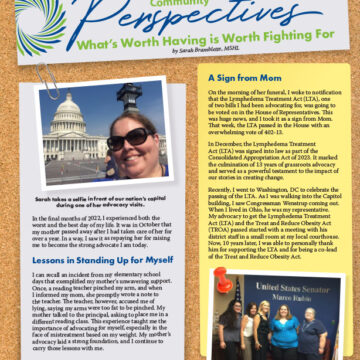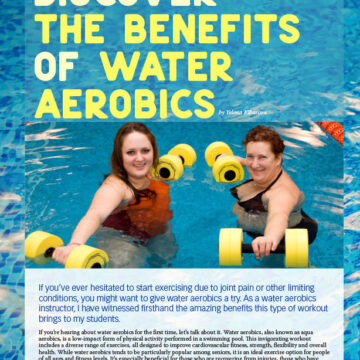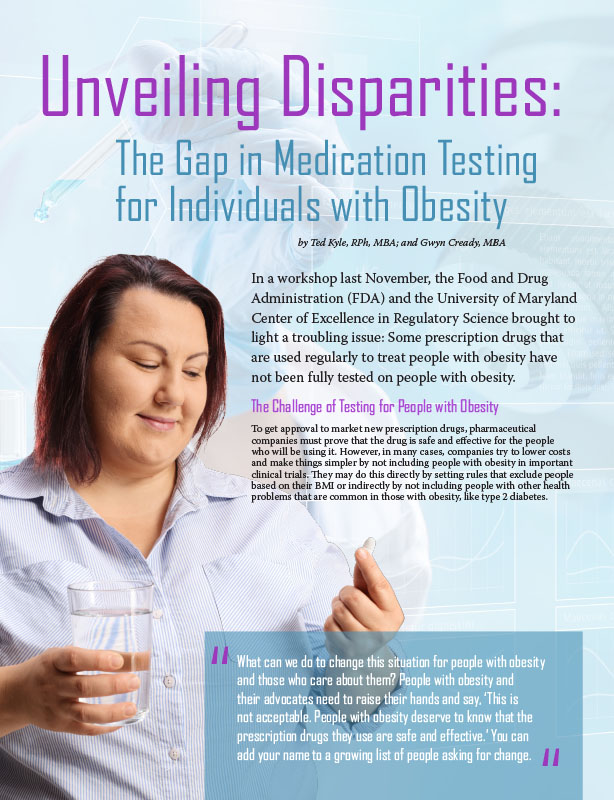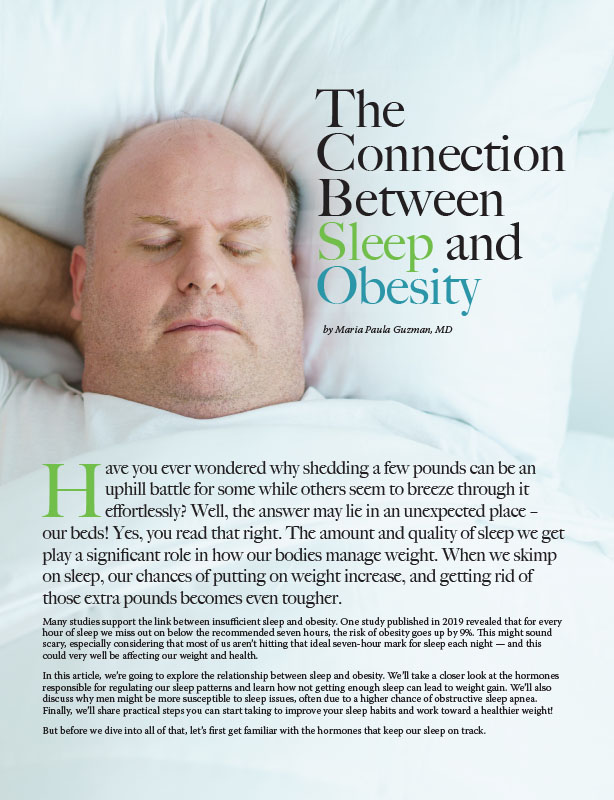Beyond Body Positivity: Why I Choose the OAC

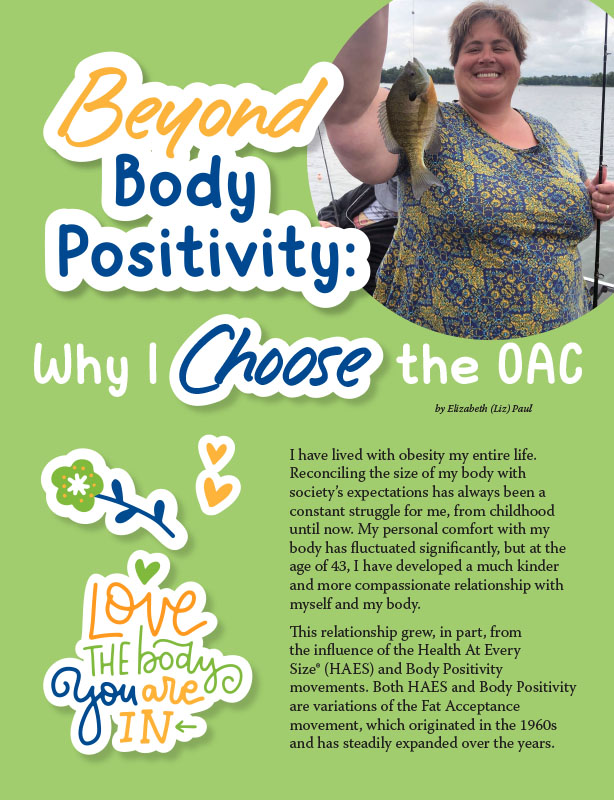
by Elizabeth (Liz) Paul
Summer 2023
I have lived with obesity my entire life. Reconciling the size of my body with society’s expectations has always been a constant struggle for me, from childhood until now. My personal comfort with my body has fluctuated significantly, but at the age of 43, I have developed a much kinder and more compassionate relationship with myself and my body.
This relationship grew, in part, from the influence of the Health At Every Size® (HAES) and Body Positivity movements. Both HAES and Body Positivity are variations of the Fat Acceptance movement, which originated in the 1960s and has steadily expanded over the years.
HAES and Body Positivity
Both HAES and Body Positivity strive to eliminate weight bias and stigma from both internal and external sources. Body Positivity specifically focuses on healing one’s personal relationship with their body and fostering a positive, loving perspective regardless of societal judgments regarding appearance, size, physical abilities, and so forth. It emphasizes cultivating a positive body image, which can be a liberating concept, albeit challenging to practice consistently, especially for those of us who grew up with negative body image and societal stereotypes ingrained in our psyches.
HAES views weight from a public health standpoint and pushes back against weight bias and stigma, particularly weight bias from healthcare professionals. It seeks to deemphasize weight-loss as a health goal. This too can be liberating for many, particularly when people who live in larger bodies are used to having medical concerns dismissed or explained away due to their size. So many people who live with obesity have experienced shame or trauma from the medical community, and I am certainly no exception there.
Reflecting on the Struggles of Public Weight Management
I first became aware of both of these movements about a decade ago when I was a weight-loss blogger. I shared my personal weight-loss journey in a public forum, and the outcome of that had a negative impact on my mental health. Even though I was having “success” at losing weight and gaining a following online, I was struggling. The pressure of public weight management made me extra critical of my body and my pursuit of weight-loss success. Despite projecting a positive image online, I experienced overwhelming self-judgment, shame and distress, especially during challenging phases along my weight-loss journey.
What I didn’t realize at the time, despite having experienced it previously, was that obesity is a chronic, complex, and multifaceted disease. Regardless of how hard I pushed and fought for control over my body, I eventually reached a point where I collided directly with the disease. No matter how much willpower I exerted or how intensely I exercised, I couldn’t continue losing weight.
Instead, I started gaining weight. As troublesome as publicly losing weight can be for your self-image, it is nothing like gaining weight in a public forum. As the trolls came out of the woodwork, my feelings of self-worth plummeted, and my weight climbed — again.
Learning Self-acceptance and Self-kindness
It was a dark period in my life. Eventually, overwhelmed by shame, I stopped blogging and set out to determine my next steps. As a failed weight-loss blogger, the weight of my shame clung to me as stubbornly as the pounds I had regained. It was during this time that I first became aware of the Body Positivity movement. I didn’t have much love for myself, and I sought solace through therapy and the support of caring friends. There was no sudden “Aha” moment I experienced; instead, a gradual realization unfolded that in order to be mentally well, I needed to accept my physical body in all its variations and sizes. Dwelling in a state of guilt and shame serves no purpose. It is not motivating or healthy, and it certainly doesn’t exhibit self-kindness. By being my own harshest bully, I do no favors for myself, my children or my loved ones.
Likewise, with HAES, I needed to take control of my health apart from my weight. I needed to eat fruits and vegetables simply because I feel better when I eat them, not because of what they might do for a number on the scale. I need to move my body because my body feels better when I do. To care about health doesn’t necessarily mean focusing on weight-loss.
I spent considerable time working on these things and my own mental health in serious ways, decoupling my internalized weight bias from the way I viewed myself and the world. I read a lot of books, listened to podcasts and talked to friends. I went to therapy. I went camping and swimming and learned about the ways my body is strong, even at my size. And it was good, and I felt better. Except, something was missing.
Seeking Solutions Beyond Body Acceptance
The Body Positivity and HAES movements did important things for helping me reframe my worldview. They gave me permission to take up space, as I am, no matter my size or shape. They insist that I have worth exactly as I am. For that, I am grateful for how they got me started on the journey to where I am today.
Nevertheless, both groups lacked something vital that I needed to move forward into a healthier and more whole version of myself: real understanding and treatment of the disease of obesity. Even as my mental health and body image improved, and even as I learned to love myself regardless of a number on a scale, I still struggled with my physical health. Despite the term “Health at Every Size,” no one seemed capable of answering the question, “What do I do when I am not healthy at this size?” From virtually any standpoint, I am not particularly healthy, and my weight exacerbates, if not outright causes, most of my health concerns. I take medications for high blood pressure and GERD, and I use a CPAP machine nightly for sleep apnea. I am considered pre-diabetic. My knees always hurt and they affect my mobility.
I find myself in the quandary that many people who live in larger bodies have: how do I love myself as I am and still find a way to treat a disease that makes me sick? I found no good answers in the Fat Acceptance world to this dilemma, so I needed to look elsewhere.
The Empowering Support of OAC
I found those answers in the Obesity Action Coalition (OAC). The OAC was the first group I found that insisted people deserve access to tools and treatments to help them manage their weight and the disease of obesity, while also advocating against weight bias and stigma in society. They welcomed me without shame for wanting to improve my health through weight management.
For me, settling for only mental health or physical health is not enough. During my early blogging days, I was losing weight and in the best physical shape of my life, yet mentally, I was struggling. Discovering Body Positivity helped heal my mental health and the shame I harbored toward my body, but I wasn’t physically healthy.
I have decided that it is okay to be selfish; I want both. I want wellness for both my body and my mind.
The OAC insists that it is perfectly okay to ask and strive for that. Furthermore, they insist that what is right for one person isn’t always right for another. Individuals living with obesity may experience trauma from society or healthcare professionals, giving them no desire to ever seek weight-loss again. That’s a good choice for their health. Others want to prioritize physical health and seek weight-loss. Again, that is their choice for their health. Some, like me, work hard to find a balance of both.
It is the OAC’s emphasis on science-based evidence, bodily autonomy, and the acknowledgment that weight stigma and bias hurts everyone that drew me away from variations of the fat acceptance movement. I understand the comfort that people find in fat acceptance (I have found it myself), but in the end, it wasn’t enough for me.
The OAC empowers me to make the choices I need for both my mental and physical health. I am empowered to fire a doctor who dismisses my concerns about my health because of my weight, or to educate someone who insists that I am “just lazy.” It strengthens me to recognize all that my body can do, and not to wait until I exist in a smaller space before saying “yes” to things I want to do. I don’t want to be shamed for my weight or shamed for seeking to manage my weight. I want to eliminate weight bias in society. I also want to see the development of science-based, effective treatments for the disease of obesity that are covered by insurance. I want to love myself enough to work toward physical and mental wellness. I want it for myself and everyone else, too. I find my allies for these personal goals in the OAC.
My journey with obesity will never be over. Obesity is a chronic condition, after all. I am proud of the work I’ve done to be where I am today. I have learned to be comfortable with my body and my story. I live with obesity and I will strive to lessen the effects of this disease. I am truly grateful to know that the OAC is alongside me as I do.
About the Author:
Elizabeth (Liz) Paul is a wife, mom, non-profit professional and obesity advocate from Mankato, MN. She has lived with obesity her entire life and uses her first-person experience to advocate against weight bias and stigma and for access to obesity treatments for all people. Liz is a member of the Obesity Action Coalition (OAC) and serves on the Membership and Mental Health Committees, in addition to serving as Co-chair of the Your Weight Matters Convention. She also enjoys camping, board games, D&D, her cats, and playing trumpet.
by Robyn Pashby, PhD Winter 2024 “No one is ever going to date you if you don’t…
Read Articleby Ted Kyle, RPh, MBA; and Gwyn Cready, MBA Fall 2023 In a workshop last November, the…
Read Articleby Maria Paula Guzman, MD Have you ever wondered why shedding a few pounds can be an…
Read Article




